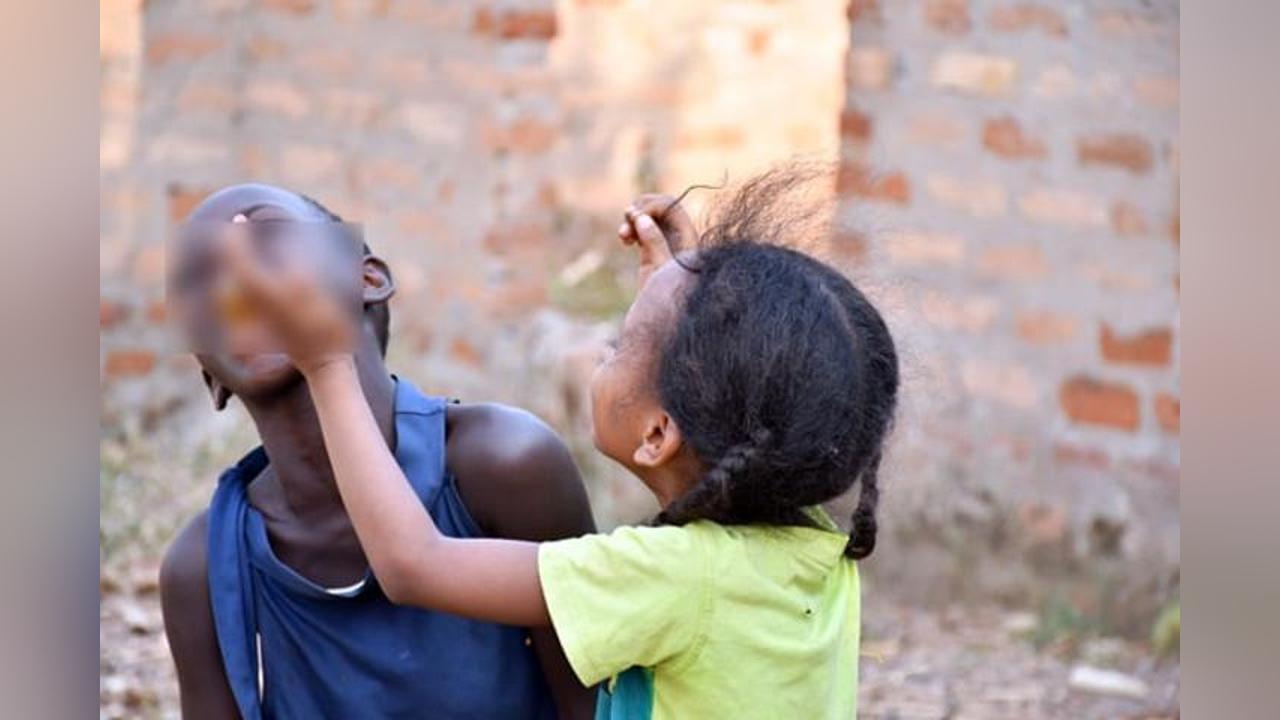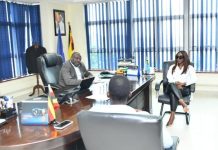Africa-Press – Uganda. Jacqueline Adero had two dreams when she wrote her Senior Four examinations in 2015: firstly, to finish higher secondary school level, and, secondly, to join the army for cadet training afterward since poverty took the options of university or tertiary studies off the table.
When Adero spoke to this newspaper in May of 2023, the resident of Arukolong, Zambia Parish, Kamdini Sub-county, regretted taking on house cleaning duties. They, she noted, pulled the plug on her dreams. It was in November of 2017 that she told us about a Chinese national only identified as Yhang fathering a child with her.
Yhang, reportedly an employee of Sinohydro Construction Company Ltd, which was constructing Karuma Dam at the time, promised to take Adero’s hand in marriage. When the project ran its course, he said he would take Adero and their child to China. Five months into her pregnancy, Adero’s hopes were dashed when she learnt that Yhang and his cohort had gone back to China.
“I couldn’t believe he was returning to China for good without me, yet I was pregnant. That was the same time I learned he was simply using me as a sexual object, but I carried the pregnancy with shame and pain until I undertook a C-section and delivered my daughter,” she said.
She also recounted how Yhang used to corner her inside his washroom and induce her into having sex after having initially asked to clean his cubicle.
“The moment he did that, he would give me Shs5,000, but warn me not to dare report the matter anywhere. I did not have options because that same job as a cleaner at their camp is what my family was surviving on,” she said.
She added: “When he realised I had conceived, that was the time he started telling me his plans of marrying me and taking me to China for fears that I or my parents would report to his superiors or police, but a month into the pregnancy, they asked me to leave the job.”
In mid-July last year, Adero succumbed to a respiratory ailment that had immobilised her for a month. Sophia Kolo, her mother, told that attempts to seek support for her granddaughter from the government through the Gender and Energy ministries via the cultural foundation of the Mwa Otiratok Clan have been futile.
“We have tried all ways but failed,” she said, adding, “We are now negotiating with an orphanage in Wakiso District to adopt her as an orphan.”
Familiar problem
A number of women claiming to have suffered a fate not too dissimilar from Adero’s say they have been left high and dry. Their stories mirror Adero’s in the sense that they claim to have had children with Chinese nationals constructing Karuma Dam.
A 28-year-old resident of Awoo Village, Karuma Town Council, told us that her aim to make a quick buck cooking and doing the laundry of Chinese nationals ended up placing her in harm’s way.
“The cubicles were never safe for any of us at work,” she said before describing the sexual abuses they reportedly had to endure, including twice shrugging off rape attempts before running out of luck.
She added: “He raped me multiple times until I conceived. He would threaten to fire me from the job if I declined his advance or cause my arrest by the army if I reported the matter anywhere.”
Elsewhere, Ms Lydia Atim was disowned by her family after having a child with one of the Chinese nationals at the contractor’s camp.
“My family doesn’t want me to step at home with the child, and I cannot do much but stay away from home. Relatives abuse me every time I take the baby home in the village for a visit,” she said, adding that feeding her child is a constant battle.
Double whammy
Ms Pamela Angwech from the Gulu Women Economic Development and Globalisation (GWED-G), said the existence of the children of mixed race sired by Chinese construction workers at Karuma Dam presents a new dilemma for a community struggling to recover from the effects of the war. GWED-G offers legal support to the victims who Ms Angwech says are hardly few and far between. From 2016 to 2020, the organisation intervened in six different cases of sexual exploitation involving male Chinese nationals operating on different infrastructure projects across the country.
“We have received many cases of sexual violations involving Chinese nationals, but it is so unfortunate that the legal arm of the State gets completely silent on these foreign culprits,” she said.
She added: “Many of them are transferred or go back to their countries…the challenge is that once you try to prosecute these cases, you can’t find the perpetrator anymore at the end of it because it starts with investigations.”
Ms Angwech said the children of mixed race born out of wedlock are adding to another unresolved problem.
“We have not dealt with children born out of war,” she says, adding, “This is the dilemma our society is now immersed in.”
‘Pursuing other avenues’
Mr Jurubabel Opio Okori, the clan head for the Adok Community in Oyam District, said the government needs to come to the rescue of the mothers.
“The Chinese contractors and their staff are visitors brought to our area by the government, and we are requesting [President Museveni] to come and collect the children of his visitors and take them back to them,” he said, adding, “Culturally, children belong to their fathers. The government should come and collect these children from here or build for them and their mothers a school that they can be taken care of from there and educated.”
All 16 cases of mixed-race children born out of wedlock were dropped by the police on account of a deficit of compelling evidence. Mr Washington Ochaya, the chairperson of Karuma Town Council, said they have documented up to 14 children of mixed-race born out of wedlock in the town council alone, with others spread in neighbouring sub-counties in the district.
“We have 14 children in the town council here alone. Twelve belong to Chinese and two belong to Indians. These Chinese workers have produced so many children with our local girls due to their vulnerability,” he said.
Whereas Sinohydro Corporation Ltd allocated Shs900m under an orphanage arrangement to support the children, the funds have not been put to use, Mr Linos Ngompek, the Kibanda North County lawmaker, who sits on the House Committee on Gender, disclosed. The orphanage arrangement caters to families that lost breadwinners during the construction works.
“If we got that money, the most important people to identify to benefit are those with Chinese children, but the money has not yet been released,” Mr Ngompek, an area lawmaker, said.
“In June, when the prime minister (Robinah Nabbanja) came here, we raised the issue before her, and she promised she would follow up. But the affected communities are also drafting a petition, which we intend to table before Parliament so that we can follow up on the matter because the other avenues are not working anymore.”
Responses
Mr Tonny Obonyo, the Sinohydro Corporation Co Ltd legal counsel, in an interview, denied the existence of mixed-race children born out of wedlock since no complaint has been filed with the company’s management.
“The company is not aware of these children because no one has told the company about them, and it is an overstretch to expect the company to know what has never been brought to their attention,” Mr Obonyo said, adding, “We have hundreds and hundreds of Chinese in the country, who might not necessarily be Sinohydro employees.”
Asked about the orphanage funding and whether any form of social support had been given to the mothers and their children, Mr Obonyo explained that it was not the responsibility of the company since there is no proof of records committing the company to support them.
“We do not have any authority over what adults do behind closed doors unless the girls bring their complaints about rape, defilement, or other forms of sexual harassment,” he said, adding, “Up to now, we have not registered any complaint of rape or defilement. We do not tolerate or condone such crimes.”
We contacted the Uganda Electricity Generation Co Ltd (UEGCL) management to seek comments on the docile orphanage funding arrangement, but Mr Enock Kusasira, the company’s spokesperson, declined to make any response. He referred us to the Energy ministry.
The Energy ministry’s spokesperson, Mr Solomon Muyita, in turn said they still lack sufficient information to take any supportive action.
“We don’t have full information about how many women and children were sired by these Chinese. We also need to understand whether these women were raped or had consensual relationships ending in childbearing,” Mr Muyita stated in a telephone interview.
“I have also reviewed the current strategic plan of the ministry, and it does not carry forward anything to do with those groups of people. But we need to study that issue further; certainly, the ministry does not condone any form of sexual abuse,” he added.
He further said a formal action or investigation can only be taken by the ministry once official complaints are lodged with them.
About Karuma Dam
Once commissioned, the $1.7b (Shs6.6 trillion) Karuma hydropower plant along the Nile is expected to generate 600 MW.
While the Ugandan government contributed 15 percent, or $253 million (Shs960b), of the project cost, China’s Exim Bank pooled 85 percent or $1.4 billion (Shs5.1 trillion) of the project financing.
Its construction was flagged off in December 2013 amid fanfare and expectations that the project would be completed within 60 months.
The Uganda Electricity Generation Co Ltd (UEGCL), the project’s supervisor (owner), and Sinohydro Corporation Ltd (contractor) have successfully synchronised the third unit of the dam onto the national grid.
Whereas they have made significant strides in completing works at Karuma Dam, the vandalised 400KV Karuma-Kawanda double-circuit transmission line has remained a major pain point.
Source: Monitor
For More News And Analysis About Uganda Follow Africa-Press






